Movie Reviews
Godzilla x Kong: The New Empire Movie Review (2024)
Explore the latest installment in Legendary Pictures’ English language kaiju epics with “Godzilla x Kong: The New Empire.” As a direct sequel to the 2021 smash hit “Godzilla vs. Kong,” this film continues the tradition of epic battles between iconic monsters. Dive into a fragmented yet engaging narrative crafted by director Adam Wingard and his co-writers, promising a thrilling ride filled with action and surprises.
Synopsis:
“Godzilla x Kong: The New Empire” takes audiences on a journey following the events of its predecessor. Led by protagonist Ilene Andrews, portrayed by Rebecca Hall, the story delves into the mystery surrounding energy pulses detected by the Monarch Project. Alongside Ilene is her adoptive daughter Jia, played by Kaylie Hottle, whose cryptic drawings hold clues to an impending catastrophe.
Joining the adventure is muckraker Bernie Hayes, portrayed by Brian Tyree Henry, as they uncover a secret civilization within Hollow Earth. This hidden world harbors giant Kong-like primates plotting their escape and domination of the surface world. Prepare for a showdown of epic proportions as alliances are forged, and ancient rivalries reignite.

Analysis of Godzilla x Kong :
In “Godzilla x Kong: The New Empire,” viewers are treated to a spectacle of thrilling action sequences and mesmerizing visual effects. However, despite its visual splendor, the film falls short of the cohesive storytelling that characterized previous entries in the MonsterVerse franchise. Director Adam Wingard’s approach yields a blend of excitement and whimsy, though the narrative suffers from frequent jumps between various locations. Nevertheless, the promise of an epic climax featuring a multitude of creatures engaged in fierce battles offers a glimmer of hope for fans craving adrenaline-fueled entertainment.
The cast of “Godzilla x Kong: The New Empire” delivers commendable performances, with Rebecca Hall and Brian Tyree Henry shining in their respective roles. Yet, the film’s pacing issues and reliance on exposition-heavy dialogue detract from the development of character relationships, leaving certain moments feeling hurried and lacking depth.
The introduction of new characters, such as Dan Stevens’ portrayal of the eccentric kaiju veterinarian, injects a dose of absurdity into the narrative. However, the film fails to capitalize on these opportunities, particularly in exploring the dynamic between Kong and a young ape encountered in Hollow Earth. Despite fleeting moments of emotional resonance, these interactions remain underdeveloped, leaving audiences longing for more meaningful exploration and growth.
In summary, “Godzilla x Kong: The New Empire” offers a tantalizing blend of action and spectacle, albeit marred by narrative shortcomings and missed opportunities for character development. While it may not reach the heights of its predecessors in terms of storytelling cohesion, the film nevertheless delivers on its promise of delivering jaw-dropping visual thrills and epic monster showdowns.
Conclusion:
Wrapping up, “Godzilla x Kong: The New Empire” presents viewers with a contradictory blend of excitement and letdowns. Undoubtedly, the film dazzles with its jaw-dropping spectacle and thrilling entertainment, drawing audiences into a world of colossal clashes and mesmerizing visual effects. However, beneath its surface allure lies a narrative that struggles to maintain coherence and depth, falling short of the standards set by its predecessors within the MonsterVerse franchise. Despite these narrative hiccups, enthusiasts of titanic monster showdowns will discover moments of satisfaction in this latest addition to the saga.
The film’s most pronounced triumph lies in its ability to captivate audiences with breathtaking action sequences and awe-inspiring visual effects. From the towering behemoths of Godzilla and Kong to the multitude of creatures that populate the screen, each frame pulsates with cinematic grandeur, immersing viewers in a realm of larger-than-life battles and epic confrontations. Director Adam Wingard’s vision materializes in a whirlwind of excitement and adrenaline, ensuring that audiences are riveted throughout the film’s duration.
Nevertheless, amidst the spectacle, “Godzilla x Kong: The New Empire” stumbles in its narrative execution and character development. Unlike its predecessors, which adeptly interwove compelling storytelling with thematic depth, this installment grapples with maintaining narrative cohesion. The plot meanders between disparate storylines and locations, resulting in a disjointed viewing experience that hampers the film’s ability to fully engage its audience.
Moreover, the characterization suffers from a lack of complexity and nuance, with many characters feeling underdeveloped and one-dimensional. While standout performances from Rebecca Hall and Brian Tyree Henry inject moments of gravitas into the narrative, they are ultimately constrained by a script that prioritizes spectacle over substance. Likewise, the introduction of new characters, such as Dan Stevens’ eccentric kaiju veterinarian, fails to leave a lasting impact, serving more as comic relief than meaningful additions to the story.
One of the film’s most glaring missed opportunities lies in its treatment of Kong and his relationship with a young ape encountered in Hollow Earth. Despite the potential for emotional depth and character growth, these interactions remain underexplored, leaving audiences yearning for a more nuanced exploration of Kong’s humanity. Similarly, thematic elements such as the film’s examination of environmentalism and humanity’s connection with nature feel superficial, failing to resonate on a deeper level.
Nevertheless, despite its shortcomings, “Godzilla x Kong: The New Empire” still delivers moments of sheer enjoyment for fans of epic monster battles. The film’s climactic showdowns, particularly the finale featuring a multitude of creatures engaged in battle, are undeniably thrilling and visually stunning. It is in these moments that the film shines brightest, reminding audiences of the sheer spectacle and excitement that the MonsterVerse franchise is renowned for.
In conclusion, “Godzilla x Kong: The New Empire” offers a mixed bag of thrills and missed opportunities. While the film excels in delivering spectacle and entertainment, it falls short in terms of cohesive storytelling and character development. Nonetheless, for enthusiasts of epic monster battles, there is still plenty to relish in this latest installment of the saga.
Movie Reviews
Humane (2024) Movie Review
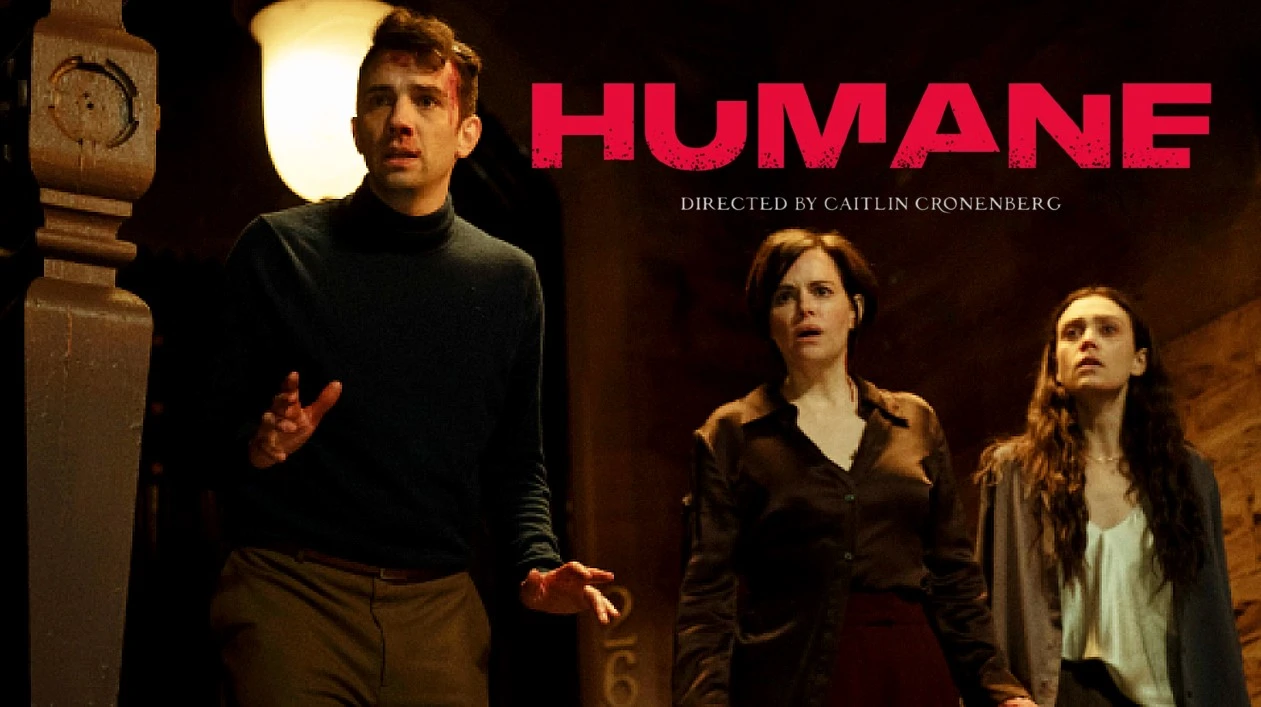
Dive into Caitlin Cronenberg’s directorial debut, “Humane,” starring Jay Baruchel, Peter Gallagher, and Emily Hampshire. Despite thematic connections to the Cronenberg legacy, this film navigates a world of forced euthanasia amid climate change. Discover its exploration of loss of control and family dynamics against a backdrop of societal collapse.
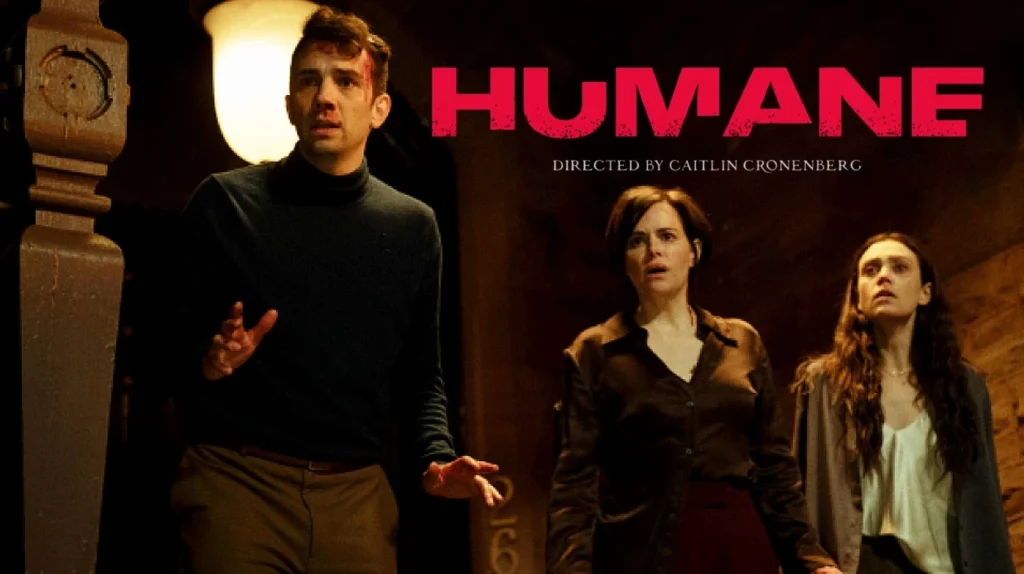
Cronenberg’s cinematic lineage extends with Caitlin Cronenberg’s directorial debut, “Humane,” featuring Jay Baruchel, Peter Gallagher, and Emily Hampshire. Despite expectations for body horror akin to David Cronenberg’s oeuvre, the film delves into surreal themes of losing control over one’s existence.
In “Humane,” Michael Sparaga crafts a premise revolving around a world grappling with climate change-induced overpopulation, leading to mandated euthanasia. However, the narrative falters, drifting into unrealistic scenarios with poorly developed characters. Despite its flaws, the film’s nightmare vision resonates, portraying a chillingly believable depiction of societal collapse.
Set within a day at the opulent home of former news anchor Charles York (Peter Gallagher), “Humane” explores the ramifications of a global mandate to reduce population. As tensions rise, Jared (Jay Baruchel), the outspoken son, embodies the callousness of societal elites, advocating for euthanasia as a necessary solution.
The narrative takes a twist when Charles and his wife volunteer for euthanasia, sparking familial discord. Amidst the chaos, interpersonal conflicts drive the plot, reminiscent of a dystopian “Succession.” Baruchel shines as Jared, a morally ambiguous figure navigating the ethical complexities of his beliefs.
While “Humane” offers intriguing social commentary on privilege and morality, its characters lack depth, hindering emotional investment. Despite standout performances, the film’s visual presentation falls short, with dimly lit scenes detracting from its impact.
Despite its flaws, “Humane” offers glimpses of insight through its COVID allegory and exploration of societal collapse. However, its execution fails to match its ambitious concept, resulting in a narrative that struggles to engage viewers fully.
Conclusion
In conclusion, “Humane” emerges as a promising addition to the Cronenberg legacy, marking Caitlin Cronenberg’s directorial debut with a bold exploration of societal collapse and existential dread. While the film draws thematic connections to the body horror imagery synonymous with the Cronenberg name, it ventures into uncharted territory, delving into surreal themes of loss of control and familial discord amidst a dystopian backdrop.
Through Michael Sparaga’s script, “Humane” presents a compelling premise of forced euthanasia in a world ravaged by climate change and overpopulation. However, the narrative struggles to sustain momentum, with thinly developed characters and a lackluster visual presentation detracting from its impact. Despite these shortcomings, the film’s nightmare vision resonates, offering a chillingly plausible depiction of a society on the brink of collapse.
At its core, “Humane” grapples with profound questions of morality and privilege, exploring the ethical complexities of survival in a world where the line between right and wrong is blurred. Jay Baruchel delivers a standout performance as Jared, embodying the moral ambiguity of a man torn between self-preservation and empathy.
While the film’s execution may falter, its underlying themes remain thought-provoking, inviting viewers to reflect on the fragility of human existence and the consequences of unchecked greed and indifference. As society grapples with real-world issues of climate change and social inequality, “Humane” serves as a timely reminder of the dangers of complacency and the importance of compassion in the face of adversity.
In essence, “Humane” offers a tantalizing glimpse into a dystopian future, challenging audiences to confront uncomfortable truths about the human condition. While it may not fully realize its ambitious vision, the film’s thematic depth and provocative premise ensure its place in the annals of speculative cinema, sparking conversations long after the credits roll.
In summary, “Humane” offers a compelling exploration of morality and societal collapse, albeit with some execution flaws.
Movie Reviews
The First Omen (2024) Movie Review
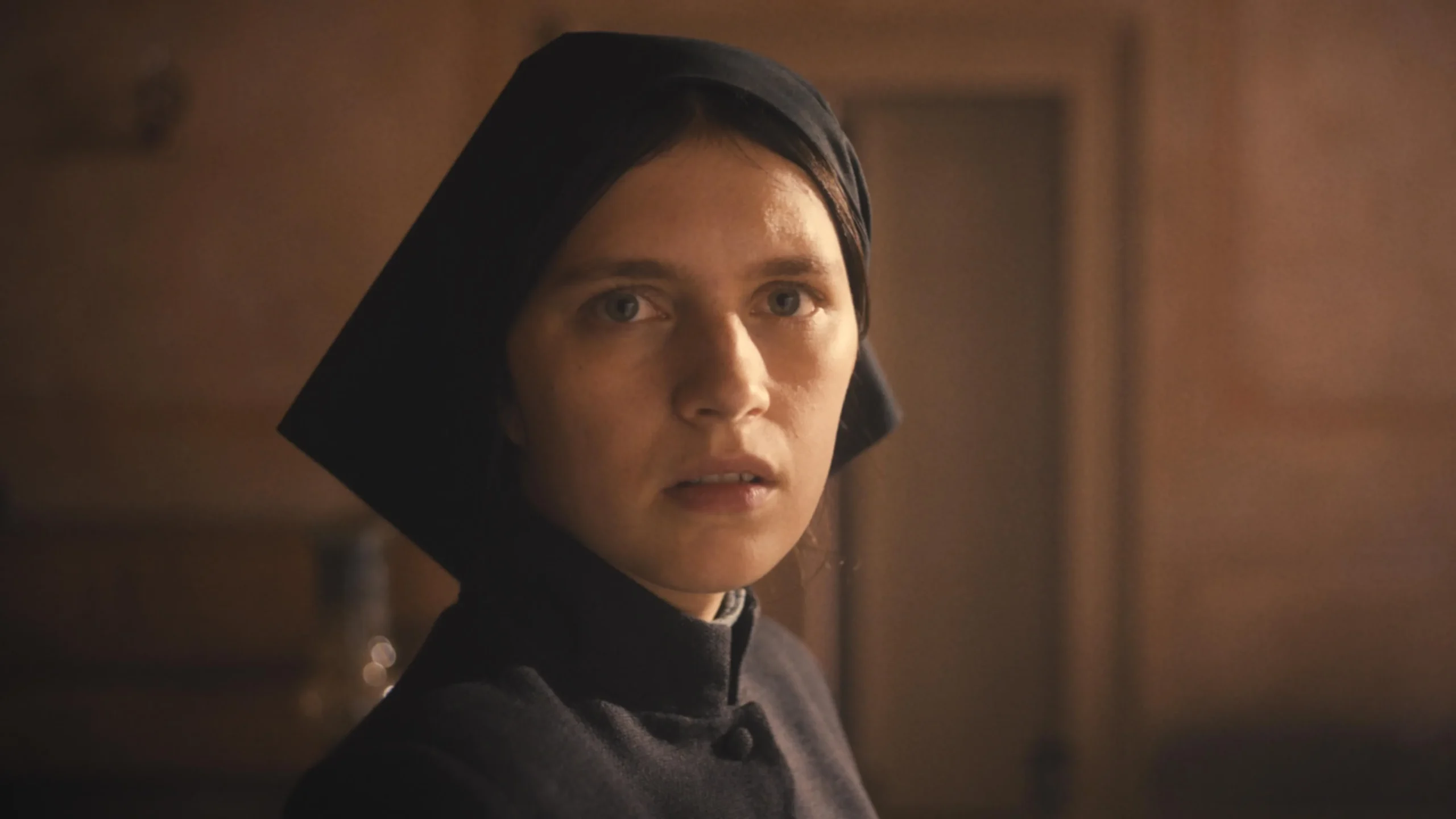
Discover the captivating world of “The First Omen,” a riveting prelude to the iconic horror classic “The Omen” (1976), expertly crafted by Richard Donner. This gripping narrative delves into the sinister origins of the Antichrist, delivering a chilling and skin-crawling experience akin to recent hits like “Immaculate,” starring the talented Sydney Sweeney.
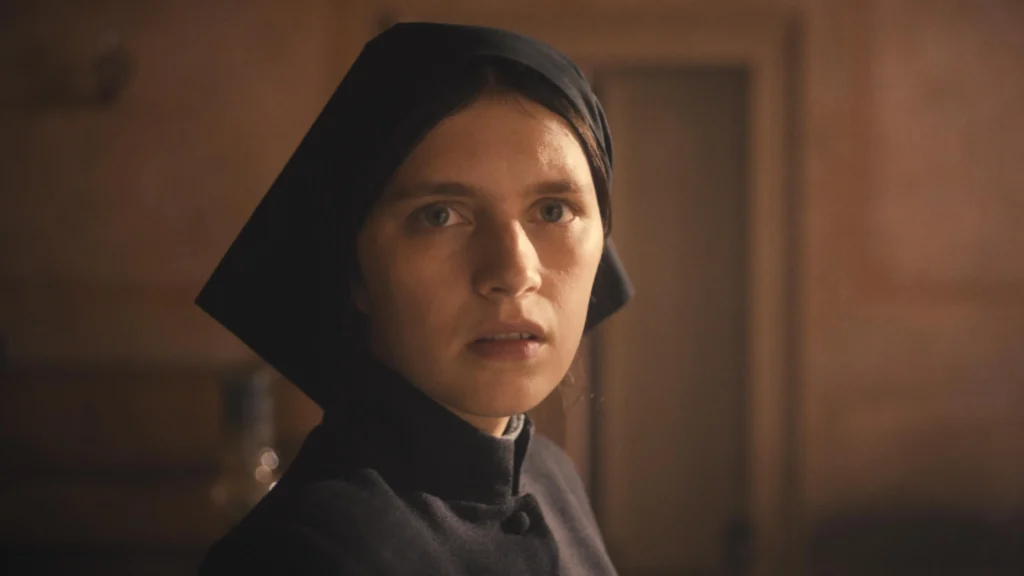
In “The First Omen,” director Arkasha Stevenson takes audiences on a journey filled with supernatural Catholic horror, reminiscent of the spine-tingling atmosphere of ’70s cinema. With its rich symbolism, vintage aesthetics, and insidious scares, this film promises to haunt viewers long after the credits roll.
But what sets “The First Omen” apart is its meticulous attention to detail and its seamless integration into the “Omen” universe. Stevenson, along with co-writers Keith Thomas and Tim Smith, masterfully explores the backstory of Damien, the Antichrist, tracing his lineage to an unsuspecting American couple portrayed by Gregory Peck and Lee Remick.
The story follows Margaret Daino, portrayed by the remarkable Nell Tiger Free, a young novitiate who finds herself embroiled in a sinister conspiracy while working at an orphanage in Rome. As she navigates a world fraught with political unrest and religious turmoil, Margaret forms an unlikely bond with a fellow novitiate, played by the captivating Maria Caballero. Together, they unravel a web of deceit and betrayal, where no one is who they seem.
One of the film’s greatest strengths lies in Stevenson’s adept handling of supernatural horror tropes, keeping audiences on the edge of their seats with each twist and turn. From its stunning period production design to its immersive cinematography, “The First Omen” offers a cinematic experience unlike any other.
Moreover, the film tackles timely themes of religion and hypocrisy, offering a thought-provoking commentary on the state of society. In a world grappling with issues of bodily autonomy and political upheaval, “The First Omen” delivers a powerful message that resonates deeply with audiences.
But perhaps the most unforgettable aspect of “The First Omen” is its daring and provocative depiction of childbirth, which ranks among the most shocking scenes in cinematic history. With its visceral imagery and unflinching realism, this film pushes the boundaries of horror and leaves a lasting impact on viewers.
In conclusion, “The First Omen” is a triumph of supernatural cinema, blending classic horror elements with contemporary relevance. With its gripping narrative, stellar performances, and spine-tingling scares, this film is a must-see for horror enthusiasts and casual moviegoers alike.
Don’t miss your chance to experience the terror of “The First Omen” – it’s a cinematic journey that’s all for you.
Conclusion
In conclusion, “The First Omen” stands as a testament to the enduring power of supernatural horror, weaving a spellbinding tale that captivates audiences from start to finish. Director Arkasha Stevenson’s meticulous attention to detail, coupled with the stellar performances of the cast, breathes new life into the iconic “Omen” franchise while offering a fresh perspective on its timeless themes.
Through its masterful blend of vintage aesthetics and contemporary relevance, the film transcends mere horror to deliver a thought-provoking commentary on religion, hypocrisy, and the human condition. Stevenson’s deft hand in crafting suspenseful sequences and spine-chilling scares keeps viewers on the edge of their seats, while the film’s immersive production design transports them to a world teeming with malevolence and intrigue.
Moreover, “The First Omen” boldly confronts taboo subjects such as bodily autonomy and political unrest, challenging audiences to confront their deepest fears and beliefs. With its daring exploration of childbirth and its implications, the film leaves an indelible mark on the horror genre, pushing boundaries and redefining the limits of cinematic terror.
In essence, “The First Omen” is more than just a prequel – it’s a cinematic tour de force that demands to be seen and experienced. As it creeps towards its chilling conclusion, one thing becomes clear: this is horror at its finest, and it’s all for us.
Movie Reviews
Abigail Movie Review (2024)
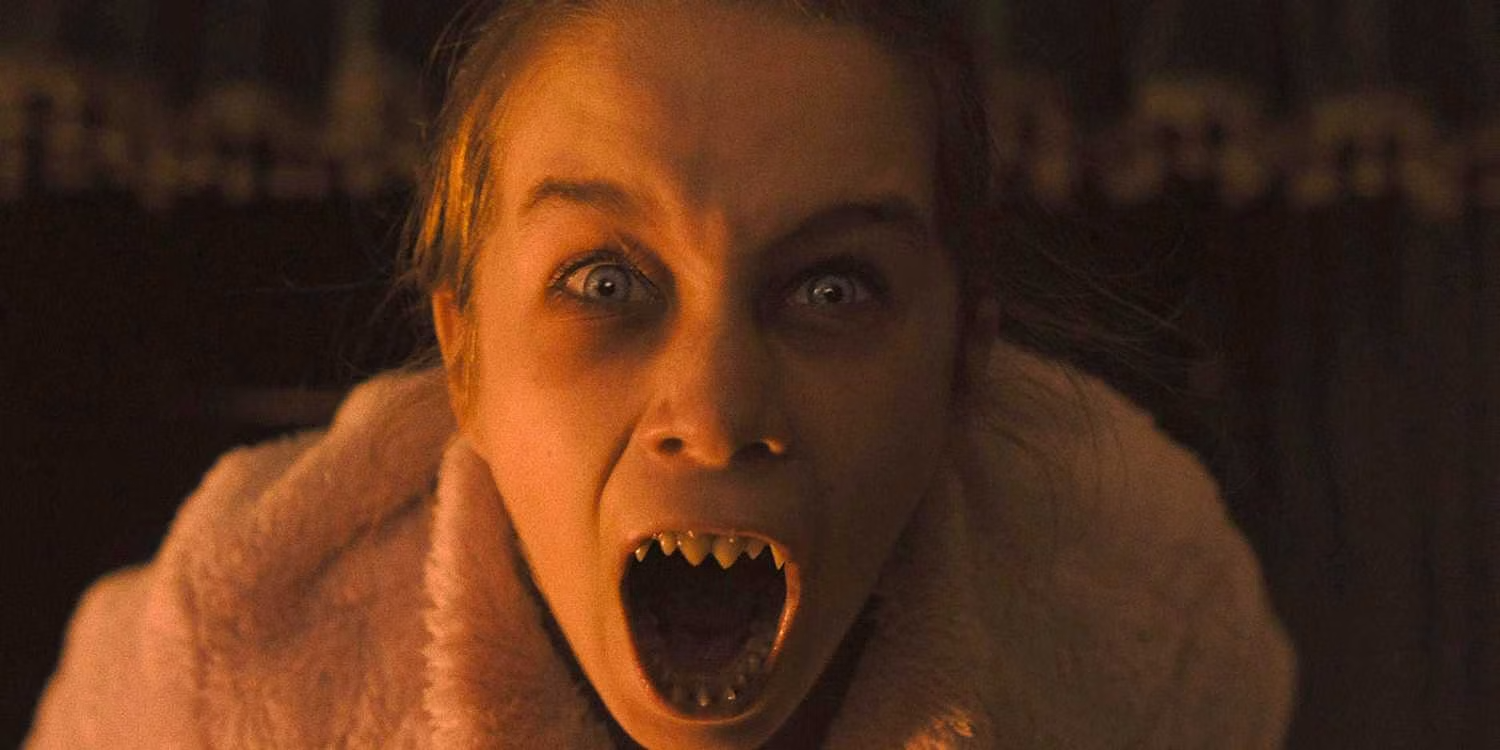
Dive into the world of “Abigail,” a horror thriller that delivers on its promises with a cast of familiar faces, viscous blood splatter, and a child-sized vampire ballerina. Read on to uncover the full story behind this genre exercise.
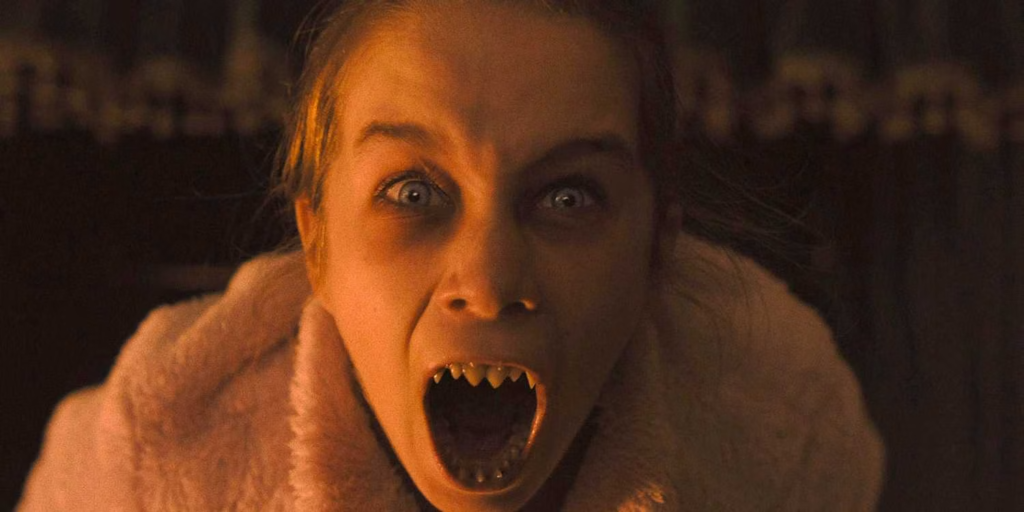
The teaser trailer for “Abigail” serves as a tantalizing glimpse into the wacky world of this high-concept horror thriller. From the minds of co-directors Matt Bettinelli-Olpin and Tyler Gillett, known for their work on “Ready or Not” and the 2022 “Scream” reboot, comes a tale of kidnappers who find themselves in over their heads after abducting a child-sized vampire ballerina, portrayed with eerie allure by Alisha Weir.
In “Abigail,” viewers are treated to a lineup of familiar faces, including Kevin Durand and Dan Stevens, who immerse themselves in the quirky characters populating this caper. From cursing to running and ultimately facing their demise, the ensemble cast delivers performances that add depth to the tic-y, schtick-y material.
The plot follows a team of bickering misfits as they embark on a mission to kidnap Abigail, the titular character. Led by the shady but well-dressed Lambert, played by Giancarlo Esposito, the kidnappers find themselves thrust into a secluded mansion with strict instructions and a looming sense of danger.
As the story unfolds, tensions rise, and the characters are pushed to their limits, particularly Peter, portrayed by Durand, whose constant struggle against the constraints of his character adds a layer of sympathy. Alongside him are a cast of tropes, including the empathetic Joey (Melissa Barrera), the irritating Dean (Angus Cloud), and the strong-silent ex-soldier Rickles (William Catlett).
However, it’s when Abigail breaks free from her restraints that the true chaos ensues. The mansion itself becomes a character, reminiscent of the iconic setting from “Clue” with added goth-y flair, setting the stage for a showdown between the kidnappers and the vampire ballerina.
Once Abigail breaks free from her restraints, chaos truly reigns. The mansion transforms into a character in itself, evoking memories of the iconic setting from “Clue,” but with a goth-y twist. This transformation sets the stage for an intense showdown between the kidnappers and the enigmatic vampire ballerina.
While “Abigail” may not break new ground, it delivers on its promises of blood splatter, vampire makeup, and well-choreographed action scenes. Despite its conventional approach, the film finds its niche audience among fans of B-movies looking for an undemanding yet entertaining experience.
In conclusion, “Abigail” offers a familiar yet satisfying journey into the realm of horror thrillers, showcasing the talents of its cast and delivering on its high-concept premise. Whether you’re drawn in by the promise of a child-sized vampire ballerina or simply seeking a night of escapism, “Abigail” is sure to deliver an enjoyable ride through the realms of the supernatural.
conclusion
In conclusion, “Abigail” may not redefine the horror genre, but it delivers a solid, entertaining experience that stays true to its promises. With a cast of familiar faces bringing life to the quirky characters, captivating visuals, and well-executed action sequences, the film offers a thrilling ride from start to finish.
While some may find the plot predictable and the characters somewhat stereotypical, “Abigail” still manages to hold its own with its blend of humor, horror, and suspense. The setting of the secluded mansion adds an atmospheric touch to the story, serving as a fitting backdrop for the showdown between the kidnappers and the vampire ballerina.
Ultimately, “Abigail” succeeds in delivering an enjoyable B-movie experience, catering to audiences seeking an undemanding yet entertaining watch. Whether you’re a fan of the genre or simply looking for a night of escapism, this high-concept horror thriller offers just the right amount of thrills and chills to keep you engaged until the credits roll. So, if you’re ready for a wild ride into the supernatural world of “Abigail,” buckle up and prepare for an adrenaline-fueled adventure that’s sure to leave you entertained.
-

 Skin Care and Beauty Tips2 weeks ago
Skin Care and Beauty Tips2 weeks agoThe Power of Sunscreen in Your Skincare Routine (2024)
-

 Top 102 weeks ago
Top 102 weeks agoTop 10 Army Sportswear in 2024: Gear Up for Performance and Style of an Elite
-

 Top 102 weeks ago
Top 102 weeks agoTop 10 Business Ideas for Couples: Building Success Together
-

 Pets2 weeks ago
Pets2 weeks agoDog Breeds in India 2024: A Vibrant Canine Mosaic
-

 Top 102 weeks ago
Top 102 weeks agoTop 10 Hollywood Movie Theaters: Where the Magic of Cinema Comes Alive
-

 Cooking Recipes2 weeks ago
Cooking Recipes2 weeks agoThe Rich Aroma and Flavor of Colombian Coffee: A Taste of Tradition 2024
-

 Skin Care and Beauty Tips2 weeks ago
Skin Care and Beauty Tips2 weeks agoHair Beauty: Unlocking the Secrets to Gorgeous Locks
-

 Entertainment2 weeks ago
Entertainment2 weeks agoDirty Pick Up Lines: A Hilarious Guide to Flirting 2024
